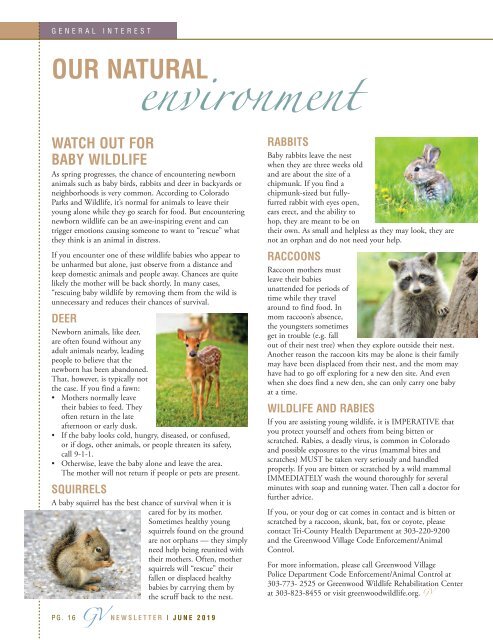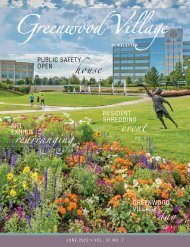June Newsletter
Create successful ePaper yourself
Turn your PDF publications into a flip-book with our unique Google optimized e-Paper software.
GENERAL INTEREST<br />
OUR NATURAL<br />
environment<br />
WATCH OUT FOR<br />
BABY WILDLIFE<br />
As spring progresses, the chance of encountering newborn<br />
animals such as baby birds, rabbits and deer in backyards or<br />
neighborhoods is very common. According to Colorado<br />
Parks and Wildlife, it’s normal for animals to leave their<br />
young alone while they go search for food. But encountering<br />
newborn wildlife can be an awe-inspiring event and can<br />
trigger emotions causing someone to want to “rescue” what<br />
they think is an animal in distress.<br />
If you encounter one of these wildlife babies who appear to<br />
be unharmed but alone, just observe from a distance and<br />
keep domestic animals and people away. Chances are quite<br />
likely the mother will be back shortly. In many cases,<br />
“rescuing baby wildlife by removing them from the wild is<br />
unnecessary and reduces their chances of survival.<br />
DEER<br />
Newborn animals, like deer,<br />
are often found without any<br />
adult animals nearby, leading<br />
people to believe that the<br />
newborn has been abandoned.<br />
That, however, is typically not<br />
the case. If you find a fawn:<br />
• Mothers normally leave<br />
their babies to feed. They<br />
often return in the late<br />
afternoon or early dusk.<br />
• If the baby looks cold, hungry, diseased, or confused,<br />
or if dogs, other animals, or people threaten its safety,<br />
call 9-1-1.<br />
• Otherwise, leave the baby alone and leave the area.<br />
The mother will not return if people or pets are present.<br />
SQUIRRELS<br />
A baby squirrel has the best chance of survival when it is<br />
cared for by its mother.<br />
Sometimes healthy young<br />
squirrels found on the ground<br />
are not orphans — they simply<br />
need help being reunited with<br />
their mothers. Often, mother<br />
squirrels will “rescue” their<br />
fallen or displaced healthy<br />
babies by carrying them by<br />
the scruff back to the nest.<br />
RABBITS<br />
Baby rabbits leave the nest<br />
when they are three weeks old<br />
and are about the size of a<br />
chipmunk. If you find a<br />
chipmunk-sized but fullyfurred<br />
rabbit with eyes open,<br />
ears erect, and the ability to<br />
hop, they are meant to be on<br />
their own. As small and helpless as they may look, they are<br />
not an orphan and do not need your help.<br />
RACCOONS<br />
Raccoon mothers must<br />
leave their babies<br />
unattended for periods of<br />
time while they travel<br />
around to find food. In<br />
mom raccoon’s absence,<br />
the youngsters sometimes<br />
get in trouble (e.g. fall<br />
out of their nest tree) when they explore outside their nest.<br />
Another reason the raccoon kits may be alone is their family<br />
may have been displaced from their nest, and the mom may<br />
have had to go off exploring for a new den site. And even<br />
when she does find a new den, she can only carry one baby<br />
at a time.<br />
WILDLIFE AND RABIES<br />
If you are assisting young wildlife, it is IMPERATIVE that<br />
you protect yourself and others from being bitten or<br />
scratched. Rabies, a deadly virus, is common in Colorado<br />
and possible exposures to the virus (mammal bites and<br />
scratches) MUST be taken very seriously and handled<br />
properly. If you are bitten or scratched by a wild mammal<br />
IMMEDIATELY wash the wound thoroughly for several<br />
minutes with soap and running water. Then call a doctor for<br />
further advice.<br />
If you, or your dog or cat comes in contact and is bitten or<br />
scratched by a raccoon, skunk, bat, fox or coyote, please<br />
contact Tri-County Health Department at 303-220-9200<br />
and the Greenwood Village Code Enforcement/Animal<br />
Control.<br />
For more information, please call Greenwood Village<br />
Police Department Code Enforcement/Animal Control at<br />
303-773- 2525 or Greenwood Wildlife Rehabilitation Center<br />
at 303-823-8455 or visit greenwoodwildlife.org. GV<br />
PG. 16 GV NEWSLETTER | JUNE 2019


















